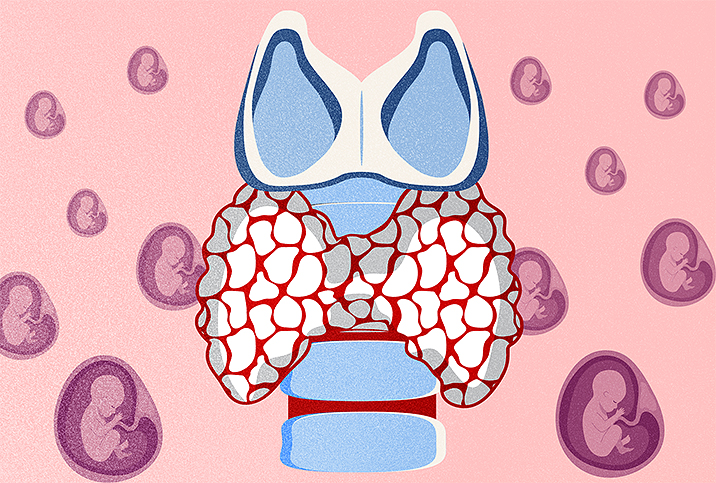Common Signs, Symptoms and Diagnosis of Hyperthyroidism

Located at the base of the neck, the thyroid gland is an extremely important part of the human anatomy. This gland's shape is reminiscent of a butterfly, and its job is to consistently release two primary hormones: triiodothyronine (T-3) and thyroxine (T-4).
Because T-3 and T-4 are necessary for the functionality of every cell in the body, an imbalance in these hormones can cause damage.
When the thyroid produces an excess of hormones, it is known as hyperthyroidism. Over time, this condition can hurt the body's ability to metabolize, regulate emotions, stabilize cardiac function, reproduce, maintain bone health and even see.
Its distinction and treatment are crucial for overall health.
Common signs and symptoms of hyperthyroidism
Hyperthyroidism can be tricky to pinpoint, as its presentation is on a spectrum. At the lowest end are the asymptomatic patients, who may be unaware they have the condition until they or a doctor discovers a lump called a nodule, or goiter, on their necks.
Along with the presence of nodules, irritability, heat intolerance, a faster-than-normal heart rate and weight loss are common symptoms of hyperthyroidism, according to Mandy Armitage, M.D., the Westfield, Indiana-based medical director of editorial services for GoodRx.
Other common symptoms, according to Sarah Musleh, M.D., an endocrinologist and co-founder of Anzara Health in Miami, include the following:
- Jittery extremities
- Shortness of breath
- Abdominal cramps
- Loose bowel movements
- Poor sleep or insomnia
- Headache
- Fatigue
- Increased anxiety or nervousness
- Muscle weakness
Women may notice menstrual cycle irregularities in the absence of pregnancy, and men may develop some form of erectile dysfunction (ED) or infertility. Because of the wide range of symptoms, many people can mistake hyperthyroidism for other medical conditions. Older people are even more difficult to diagnose because they tend to experience ailments that often overlap with those typical of aging.
Testing and a diagnosis of hyperthyroidism
To be diagnosed with hyperthyroidism, patients need to exhibit symptoms (and mention them to their doctor) and undergo a physical exam and imaging studies to detect nodules or goiters on the thyroid gland, according to Musleh. If hyperthyroidism is suspected, a doctor will perform a blood test to analyze T-3, T-4 and thyroid-stimulating hormone (TSH) levels.
If the results indicate hyperthyroidism, doctors will conduct more tests to determine the cause.
Another benefit of proactive intervention is the ability to treat severe potential conditions, such as thyroid cancer, before they reach a fatal level.
The hallmark exam after positive results is called a radioactive iodine uptake scan (RAI). During the scan, patients ingest a minimal dose of radioiodine so doctors can view how much of it accumulates in the thyroid gland and where.
If iodine uptake is in excess, the likely culprit is hyperthyroidism. Doctors may also choose to administer a thyroid ultrasound, which utilizes high-frequency sound waves to create an image of the thyroid and nodule characteristics.
What is the role of the thyroid gland?
The thyroid gland is essential for a variety of bodily functions. In younger populations, thyroid disease affects central nervous system (CNS) growth and development, which can cause indefinite neurological problems. In older adulthood, it impedes homeostasis in other organ systems.
Cardiovascular, gastrointestinal, reproductive, respiratory, skeletal and visual consequences are other results of an overactive thyroid because thyroid hormones control cell efficiency.
Without thyroid hormones issuing orders, the body is unable to determine how and when to perform its typical operations. While the thyroid gland impacts the entire body, its predominant function is to regulate metabolism—the process of transforming food into energy—and provide cells with the fuel they need. The added strain from hyperthyroidism speeds up internal processes in an unhealthy way and can lead to system failure.
Who should you see for hyperthyroidism and when?
Endocrinologists are considered thyroid disease specialists, but many cases of hyperthyroidism can be treated by a primary care physician (PCP), according to Armitage.
Patients should seek a consultation if they notice any lumps on the thyroid gland, especially if they are jointly experiencing troublesome symptoms such as:
- Unintentional weight loss
- Vision changes
- Body temperature
- Mood and heart rhythm irregularities
- Disruptions to sleep patterns
- Menstrual cycle in the absence of pregnancy
Dermatological indicators are varied and some patients have reported hyperhidrosis stemming from heat sensitivity.
One potential symptom patients should seek immediate help for is called thyroid storm, which Armitage defined as a "life-threatening, multisystem complication," and is indicative of astronomically high thyroid hormone levels.
Warning signs of this rare condition include:
- Gastrointestinal disturbances (nausea, vomiting and diarrhea)
- Confusion
- Fever
- Symptoms of cardiac episodes, such as breathing problems and heart rhythm abnormalities
What happens if hyperthyroidism goes undiagnosed?
The consequences of untreated hyperthyroidism are extensive, and the thyroid's importance to all areas of the body is evident when you see all of the potential issues.
Musleh and Armitage said a selection of physiological effects, such as the following, can result from untreated hyperthyroidism:
- Arrhythmia and heart failure
- Osteoporosis and bone fractures
- Visual impairments and thyroid eye disease (TED or Graves' ophthalmopathy)
- Weight, muscle and hair loss
- Irregular periods and infertility
- Skin problems
- Thyroid storm
- Death
Musleh said the following psychological complications can also arise:
- Fatigue
- Irritability
- Insomnia
- Anxiety and depression
- Poor memory and concentration
- Delirium and confusion
Discovering a thyroid nodule or goiter in its early stages is paramount to reducing these complications. Another benefit of proactive intervention is the ability to treat severe potential conditions, such as thyroid cancer, before they reach a fatal level.
Treatment options, side effects and costs
Someone suffering from hyperthyroidism has several treatment options. Many are covered by health insurance and usually include copays for prescriptions and doctor visits.
Once a diagnosis is made, an endocrinologist or PCP will work with the patient to develop the most appropriate regimen. Armitage said this is determined by the condition's underlying cause.
"Typically, doctors will address the most pressing symptoms first by prescribing medication that can help lower blood pressure and stabilize the heart rate," Armitage said. "Then, depending on what's causing the hyperthyroidism, doctors may recommend a different medication, radioactive iodine therapy or surgery."
Prescription antithyroid medications are available to treat hyperthyroidism. They help by hindering the thyroid's ability to produce hormones. Side effects are uncommon but include itching, rash and fever; in extremely rare cases, liver disease may be a result.
Though symptom alleviation could occur in a few weeks, treatment duration tends to be much longer, and patients often require beta blockers as a supplement. Prices for uninsured patients vary greatly depending on type and dosage, but doctors frequently wean people off over time.
The top treatment choice for hyperthyroidism is radioactive iodine (RAI) because it is a single-dose, permanent solution that weakens or eliminates thyroid cells. Since these are the only cells with the ability to absorb iodine, there is minimal impact on the rest of the body, and this does not increase the chances of cancer.
However, it is common to kill too many cells and cause hypothyroidism, so patients often need to take replacement hormones. Costs for this can range from hundreds to thousands of dollars, depending on additional fees.
Thyroidectomies are used infrequently to remove parts of the thyroid—or the entire thing. The recovery time is short and most patients are discharged within days.
Aside from the development of hypothyroidism and a small risk of injury to surrounding areas, thyroidectomies are relatively safe procedures. However, surgery is by far the most expensive treatment. It generally costs more than $10,000 plus doctor fees.


















